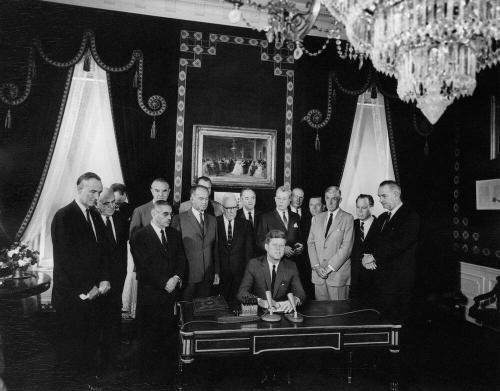No two countries have a greater impact on global nuclear security than the United States and Russia. They control, between them, well over 90 percent of the world’s nuclear weapons. They can lead in mustering diplomatic clout to raise the bar against nuclear proliferation. The signing of the New START Treaty in April was a major step in reducing U.S.-Russian nuclear weapons, and it also set the stage for a successful Non-Proliferation Treaty (NPT) review conference in May.
The pace of the U.S.-Russian nuclear dialogue has slowed over the past few months, as the sides await ratification and entry into force of the New START Treaty. The Obama administration hopes the Senate will take up the treaty in the lame-duck session following the November mid-term elections. By all appearances, the Russian Duma looks to the Senate to act first. While waiting for their respective legislative bodies to ratify New START, there are important and useful things that Washington and Moscow can discuss now to promote a more secure nuclear world.
Former Secretary of State Madeleine Albright and former Russian Foreign Minister Igor Ivanov published an opinion piece in the October 13 Financial Times describing such steps. That followed an article the two former ministers co-authored with Brookings President Strobe Talbott and Institute of World Economy and International Relations (IMEMO) Director Alexander Dynkin for the October 11 Russian Kommersant.
These articles outline four areas for U.S.-Russian work now: (1) consultations on issues—such as verification of limits on tactical nuclear weapons—that could prepare the way for the next formal round of U.S.-Russian arms reduction negotiations (presumably after New START enters into force); (2) cooperation on missile defense to protect Europe, including European Russia; (3) building on the April nuclear security summit’s agreement to secure all highly-enriched uranium and plutonium stocks by 2014; and (4) follow-up to the NPT review conference to tighten the non-proliferation regime.
The two opinion pieces flow from an Albright-Talbott-Ivanov-Dynkin meeting in June and follow-up exchanges over the summer, with significant input from Brookings and IMEMO. The resulting paper was shared with senior U.S. and Russian officials in September. Brookings will host a panel discussion on October 15 to discuss the paper and its recommendations for moving the U.S.-Russian nuclear dialogue forward.



Commentary
Washington, Moscow and Nuclear Security
October 14, 2010